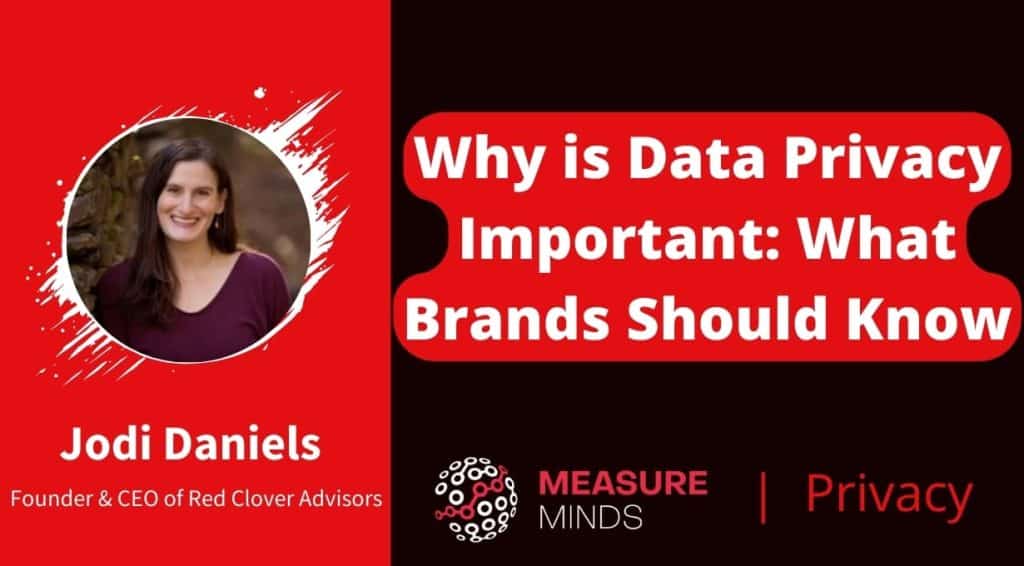
Why is Data Privacy Important: What Brands Should Know
Data privacy is becoming more and more important to consumers. But why should you care, and more importantly, what should you do? Let’s look at data privacy in more detail and how you can win customer trust.
This is a webinar write-up of Jodi Daniels’s talk at Privacy4Marketers. You can get the slides here. You can purchase the recordings (8 in total) or get them for free by signing up to a paid Cookiebot plan using our referral link. Just make sure to send a screenshot of the billing confirmation to william@measuremindsgroup.com.
Customers don’t trust businesses
As many as 72% of Americans are reluctant to share their data with businesses. If you would like your data to be as accurate as possible, this is a problem. After all, if lots of customers are refusing consent, you’ll have lots of data gaps.
This means your decision-making process will be based on bad data. You won’t get the customers or the results that you need.
Build a roadmap to customer trust
To solve this problem, you need to build a roadmap for customer trust. But where should you begin? Your roadmap should contain the following areas.
- Build a privacy policy – This is your outward expression for communicating with customers about what’s happening on your site.
- Creating privacy principles – What information is your organization comfortable collecting?
- Educate consumers on privacy rights – Legislation assigns a variety of rights to consumers.

The current state of privacy legislation
The EU, UK, and Canada are leading the way with privacy legislation in the modern era with the General Data Protection Regulation (GDPR). Canada has introduced the Personal Information Protection and Electronic Documents Act (PIPEDA).
Businesses worldwide have had to face the hard truth about GDPR and other laws, and how they impact data collection activities.
Over time, the United States has also begun introducing privacy laws state-by-state. Each of these state laws has its unique requirements. The five major pieces of legislation are:
- In California: Consumer Privacy Act (CCPA).
- In Virginia: Consumer Data Protection Act (VCDPA).
- In Colorado: Privacy Act (CPA).
- In Connecticut: Data Privacy Act (CTDPA).
- In Utah: Consumer Privacy Act (UCPA).
As seen in the map below, more legislation is coming soon. Everything in green has passed, whilst the states in yellow and blue have had new laws introduced.*

You can see that more than half the country is covered. The number of grey states on the map will continue to diminish.
By the end of 2024, the personal data of 75% of the world’s population will be protected by data laws.
*It should be noted that these are ‘comprehensive data laws’. There are lots of other pieces of privacy legislation that address specific areas. For example, childcare, healthcare, use of email, etc.
Avoid becoming a headline
There are plenty of examples of companies not putting privacy at the heart of their practices. As you can see below, when this happens it makes the headlines.

These are big headlines. Compliance is essential for avoiding these kinds of scenarios and winning the trust of customers. Remember, research shows this is an essential task for businesses.
This stat underlines the scale of the challenge ahead – 81% of Americans are concerned about how businesses are using their data.
Privacy as a Unique Selling Point
With work and effort, you can turn privacy into a unique selling point. Let’s explore the five key USPs of privacy.
Trust and brand reputation
Each of the headlines we shared earlier presents a brand challenge. Your name has been viewed across these headlines. Suddenly customers won’t be focusing on the good things you do, they’ll focus on the negatives.
For maximum transparency, review your privacy notice. This is the best place for building trust and connecting with customers. You’ll tell the customer what data is collected, how it is used, where it’s stored, and with whom it has been shared. It’s also a space to inform a customer of any individual rights
Alongside the full notice offer a short, summarized version. Include hyperlinks so it’s easy for a searcher to find the info they need. Consider the font style, colour, and size, to guarantee maximum readability.
Tone, simplicity, and brand style are fundamental. Ensure accuracy and provide all the correct disclosures. Above all, say what you mean and do what you say. Your privacy notice should reflect what you’re doing as a business at all times, make sure it’s updated when necessary.
Competitive Differentiator
One of the ways we can build trust is by building a ‘trust centre’. This is a page that houses all your organization’s privacy policies. You’ll also list the privacy and security features of all your products.
Carefully explain all the data your business collects in real time (and via your trust centre). For example, if you’re collecting personally identifiable information (PII), explain why it’s needed and what you’ll do with it. By doing so, you’re building an element of transparency and disclosure that helps build trust.
Compliance as an asset
When dealing with many different laws, it’s useful to explain how you’re compliant. This could be offering a link to a data protection agreement or privacy and security notices.
Look at some of the biggest CRM and email service providers, such as Hubspot or Salesforce. You’ll notice that these companies have created entire privacy centres. Use these as inspirational models for your approach.
Of course, you don’t need to match these models. A single page with a link to your data protection addendum and some bullets explaining your approach to security and privacy can be just as effective.
Try to anticipate the customer’s privacy and security questions. Answering these within an FAQ will speed up your sales process. It will also alleviate the concerns your customers might have. Ultimately, the more you disclose as a company, the more you’ll win trust.
Your cookie banner is the first thing a customer will experience when arriving on your site. This makes it an essential part of the overall customer experience.
Unfortunately, businesses often make simple mistakes with their banners that hinder experiences. Examples of these issues include:
- Blocking users from interacting with your site due to an intrusive cookie banner.
- Using banners that are unresponsive to mobile users.
- The declaration is not translated into the correct language.
- Copying what a competitor is doing.
- Including dark patterns on your banner.
- Neglecting thorough testing of your banner on mobile and desktop.

Review and test your setup to ensure you’re getting cookie consent right. Do this as often as you alter your cookies or change your website. Cookie banners can break because of website or plugin updates, the addition of new uncategorized tags, and many other factors.
If your site contains lots of pixels, make sure you set standards for introducing new third-party cookies. Again, monitor any updates and test to ensure your setup is working as it should be.
Make it simple for the customer to opt-out
What is your individual rights process? Remember, this doesn’t just apply to cookies or pixels, but email, text messaging, phone calls, and many other areas. So, ask yourself the following questions.
- How can an individual make a request?
- How will your business receive and honour the request?
- How will your company communicate to an individual?
- Are you training people effectively within your company?
The privacy rights process is a part of your brand experience. More than just a compliance activity, it represents how the consumer engages with your company and brand.
The likelihood of receiving a rights request becomes much lower through transparency and using data in ways that won’t surprise customers.
Privacy considerations before launching a new product or marketing Campaign
Before launching any product or investing in data marketing services, ask the following questions about your data collection.
- Is it sensitive? – How can you ensure customers feel comfortable sharing their data?
- Is it required? – Is data essential to you? You don’t need to collect everything.
- Where will it be stored? – Customers want to know how you’re storing and using data.
- What will my customer/prospect think? – Will they be happy or concerned?
- Is it covered in the privacy notice? – As established, this is essential for winning trust.
- Are there any privacy laws in scope? – Laws vary depending on customer location.
- Are there additional security measures needed? – Can you keep data secure?
Privacy considerations when using AI
AI is a key part of the modern privacy conversation. If you’re using any kind of profiling, you must consider the different requirements of privacy laws. You may need to disclose that you’re using AI within your privacy policy. If you’re using personal information in your campaigns, you must honour opt-outs.
There are also several ethical considerations to bear in mind. Be open and honest about how you’re using AI. Your trust page can be a good place to disclose these details. The more transparent you are, the more trust you’ll gain from customers.
Consider the kinds of personal information that are being collected and used for AI. If you’re using any third-party vendors, who are they and how will they be using data? Most importantly, how will they be protecting the data they collect? All these factors should be carefully reviewed before working with a third party.
Data privacy is everyone’s responsibility
Privacy is here to stay. It needs to be incorporated into every decision. More and more laws are on the horizon. Luckily, these laws tend to focus on similar principles: tell the person what’s happening and give them choices over their data, only collect what is needed, and always protect the data.
To future proof, know where your customers are. Maintain the basics, know your data, and regularly review your privacy notice. Most importantly, only use the data in a way that the customer expects.
Going forward, take the following tips for success with you. Stick to them as you craft your approach to data privacy.
- Someone needs to “own” privacy.
- It’s not a set-and-forget activity.
- Remember the basics:
- Collect what you need to
- Disclose why you are collecting it.
- Allow individual choices (eg. allow the chance to opt-out).
- Protect the data.
- Know your vendors.
- When in doubt, find an expert resource and ask for help!
- Put the customer first.
- Don’t just copy who you “think” is doing a good job!
- Communicate your company’s privacy practices.
About Jodi Daniels
Jodi Daniels is the founder and CEO of Red Clover Advisors, a privacy consultancy that simplifies data privacy compliance, helps companies build trust with customers, and serves as the organization’s outsourced privacy officer. Jodi is a national keynote speaker, co-host of the top-ranked She Said Privacy / He Said Security Podcast, and co-author of the Wall Street Journal & USA Today, also the best-selling book Data Reimagined: Building Trust One Byte at a Time.

- How to Blend GA4 & UA Data Using BigQuery & Looker Studio - 12/07/2024
- How to do a Google Analytics 4 Audit & Mistakes to Avoid - 10/07/2024
- How to Backup & Visualize GA3 Data for Free - 27/06/2024